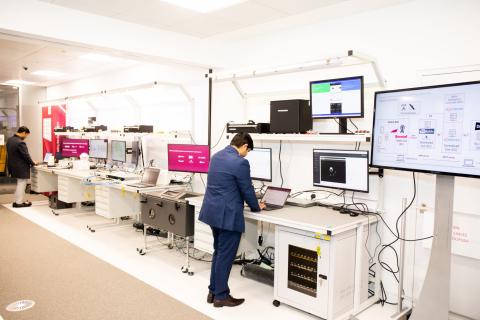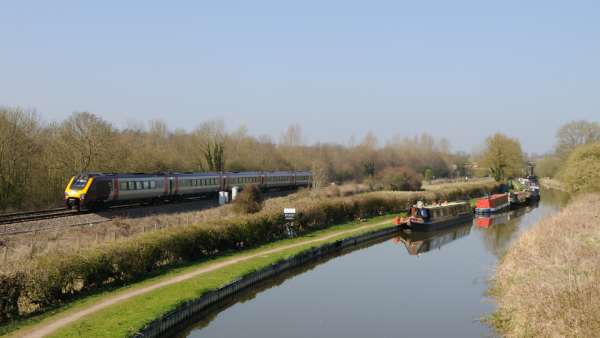
South East
Home to the UK’s capital and a thriving ecosystem of industry, from cutting-edge start-ups to tech and telco heavyweights
The South East has long been home to a number of tech and telecoms giants and the capital continues to be a mecca for tech start-ups and VC investment. Indeed London is the second fastest-growing tech hub in the world since 2016 with emerging specialisms in AI and cybersecurity. But the South East is much more than London, with a long history of collaboration and innovation. It boasts three innovation corridors around the M3, M4 and M23 and three distinct urban tech clusters, each with their own, wide-ranging specialisms.
Read the Spotlight on Barnet Council Connected Places Programme

Technologies & trends
The region boasts expertise and capabilities in a number of key telecom fields. Learn more about the relevant technologies.
The potential benefits of 5G, future wireless generations and full-fibre digital connectivity can only be realised if we have confidence in the resilience of our infrastructure.
From established corporates to emerging cybersecurity start-ups and strong academic research, London and the South East boasts considerable commercial expertise in the security space. The region is also home to LORCA, the London Office for Rapid Cybersecurity Advancement; the South East Cyber Resilience Centre, a police-led partnership with academia and businesses; and the National Quantum Computing Centre.

Wireless networking is experiencing a period of exciting change with the development of new generations from 5G to 6G, WiFi 6 and 7, offering new use cases and business cases that extend far beyond just faster speeds.
The M3 and M4 Corridors, as well as London, are home to a vast number of organisations in the wireless networking space, including all major UK mobile network operators.

Core networks are critical infrastructure and new digital technologies and trends have the potential to disrupt and transform, ensuring capabilities, resilience and performance can meet emerging and future needs.
The region is home to a number of innovators and established organisations in this space. Additionally, it has a strong research pedigree. University of Surrey's Institute for Communicaiton Systems is home to the 5G / 6G Innovation Centre, one of the largest and more renowned academic research centres in its field in Europe.

Non-terrestrial networking (NTN) refers to any network that involves space or airborne elements, including satellite communication networks, high-altitude platform systems (HAPS), and air-to-ground networks.
The University of Surrey is home to a 5G / 6G Satellite Networking Testbed. Unique to the UK, it allows end-to-end trials of new services over satellite as well as research and development of new 5G/6G non-terrestrial-network equipment.

Artificial Intelligence (AI) is disrupting industry on a broad scale and the telecoms sector is no exception, with Valuates projecting that the global AI in telecoms market size will reach $14.99B by 2027, up from $11.89B in 2020.
London is a globally-recognised hub for AI development, with an AI-readiness index compiled by SAS in 2022 showing West London emerging as an AI cluster. The region also boasts strong academic credentials, with London universities sitting alongside Oxford, University of Surrey and University of Kent when it comes to AI research.

Network management systems can be a critical driver of business value in the telecom industry, facilitating improved customer experience, optimised infrastructure operations and management of threats.
The ARI-5G project, part based in the South East, is driving progress on network management and optimisation for Open RAN.

Optical communication refers to the use of light to carry a communication signal to the remote end, instead of an electrical current.
The Optical Networks Group at University College London is a world-renowned team conducting research into the fundamental properties of light and how it can be used to generate, carry, route and process data for different applications. While the Future Photonics Hub, located in the University of Southampton, bridges the gap between academic research and product development by bringing industry and funding agencies together to co-invest in R&D.

Diversification of the telecoms supply chain is ultimately about choice, a desire to broaden the choice of equipment and solution providers in the sector-driven by commercial, technical and geopolitical factors. From universities to start-ups and established corporates, the South East region is exceptionally well represented across UK diversification projects: Flexi-DAS, part of the UK/Republic of Korea (ROK) Open RAN R&D collaboration competition boasts London and Berkshire based companies alongside the University of Surrey. From the Future RAN Competition, the region is participating in a significant number of projects: CoMP-O-RAN, OpenRAN ARTS, Best of British RAN Development, Flex-5G, 5G Drive, 5G DU-Volution and Secure 5G Platform using Novel, Efficient Wideband PA. While both REASON and TUDOR in the Future Open Networks Research Challenge feature universities and companies that call the South East home. And London-based SONIC Labs offers advanced interoperability testing for open network solutions.

Deploying 5G in Places
We've spoken to local authorities up and down the UK, to hear first hand how they've approached digital infrastructure and connectivity programmes. Designed to be both practical and pragmatic, we've collated insights, assets and guides that can be replicated and adapted to help you on your journey to 5G.
Discover some of the ways you can seize the opportunity and be better connected.
SIPP Oxfordshire County Council Project Report
This is the official closure document for the Oxfordshire County Council project which was funded by the Department for Science, Innovation and Technology.




















